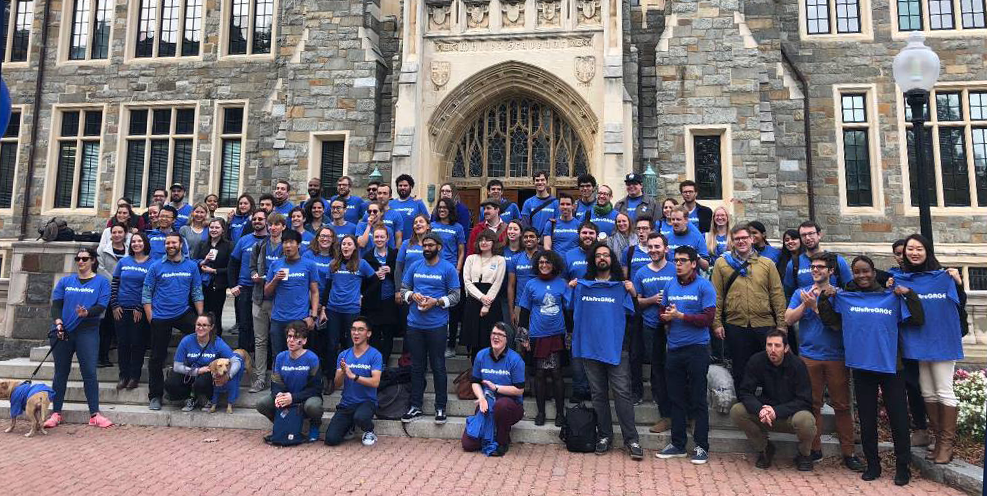Members of Georgetown University’s graduate student union reflect on their journey to recognition one year after the union signed its first contract with the university.
The Georgetown Alliance of Graduate Employees’ first union contract with the university, signed May 8, secured pay raises, expanded health benefits and improved mental health resources for graduate student workers. The agreement came months after graduate workers entered negotiations over COVID-19 safety protocols.

The finalization of the union contract amid the COVID-19 pandemic was a testament to the strong commitment GAGE members have to one another, according to GAGE President Daniel Solomon (GRD ’23).
“A year ago I think was a moment that reflected the strength of the organizing that we had done and the extent to which members really demonstrated that they were committed to showing up for each other, despite the current displacement that the pandemic caused for all of our health and safety and livelihoods,” Solomon said in a phone interview with The Hoya.
The May 2020 contract was also a step toward making graduate work more equitable across socioeconomic statuses and racial and ethnic backgrounds, according to Jewel Tomasula (GRD ’22), a biology student and former president of GAGE.
“It’s a really challenging career to go into, in general, and then especially if you are from a minority background or a disadvantaged group, and so our contract was a really big step forward in changing that at Georgetown,” Tomasula said in a Zoom interview with The Hoya.
The fight for recognition began in 2018 when Georgetown graduate students voted to unionize following a yearlong campaign for increased worker protections from the university. After over a year of in-person advocacy, GAGE began to lobby virtually when the university shifted to fully remote operations because of the COVID-19 pandemic.
GAGE also fought for COVID-19 related protections, submitting demands for increased health protections and job security in July 2020. Two months later, GAGE filed a grievance against the university alleging breach of contract after the university refused to negotiate over COVID-19 protections.
In January 2021, an independent arbitrator ruled that the university did not bargain in good faith with GAGE regarding grievances over COVID-19 related policies. As a result, the university met graduate students’ demands for personal protective equipment, COVID-19 testing and subscriptions to mental health services.
Increased COVID-19 protections for workers were made possible by GAGE’s commitment to building relationships based on collective action to improve the lives of workers, according to Solomon.
“We’ve had these important victories that couldn’t have happened without that committed organizing and the commitment to building personal relationships that all align with a collective vision of improving the lives of graduate workers at Georgetown,” Solomon said.
As of the May 2020 contract, all PhD candidates have access to full dental insurance through the union. The contract also granted graduate workers on nine-month contracts with a 12% pay boost to $32,500 and workers on 12-month contracts a 15% boost to $35,500. Previously, the Executive Committee of Graduate Studies, a body of faculty members and deans responsible for crafting graduate student policies, decided graduate student workers’ stipends and benefits.
The contract was especially important for graduate students who do not have access to health insurance, according to Ellen Jacobs (GRD ’24), a biology student and chair of GAGE. The contract allowed Jacobs to visit an eye doctor, dentist and primary care physician.
Jacobs, who lives in California, said the pay raises and insurance included in the contract have increased the living options graduate students will have when they move back to Washington, D.C.
“The pay raise is also very nice. It means that when I do move to D.C., I can live somewhere a little bit nicer than I did maybe last year when I was really concerned about trying to afford something in the D.C. area on the pretty small stipend we were getting,” Jacobs said.
The return to in-person classes in the fall will allow graduate workers to see the full extent of the agreement, including the Emergency Assistance Fund, an emergency fund for graduate student workers which will be replenished annually, according to Tomasula.
“As we come back to campus and we have a graduate experience that is on campus, is in our workspaces and people have to be in D.C., I think people are going to experience the benefits of the contract in new ways, and I’m excited for that.” Tomasula said.
Tomasula said she is looking forward to seeing how the contact benefits workers in the long run.
“It’s kind of exciting to think about how the contract is going to keep helping people as time goes on,” Tomasula said.










